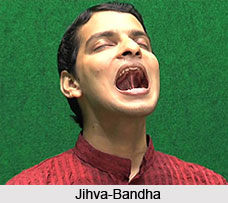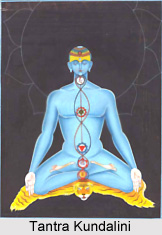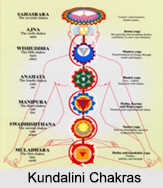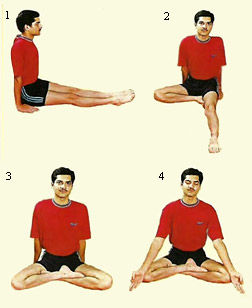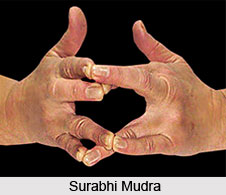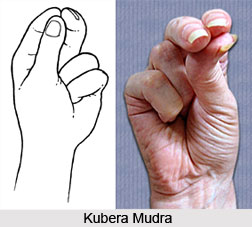 For a Bhakta who wants to practise Bhakti yoga, is very important for him to understand the need and the aim, since these would strengthen his will for doing the same. Bhakti yoga seems to be very simple and easy to practise but for a person, who leads a hazy path, has to practise this yoga continuously till he reaches the realm of realization. Then after the continuous practise, there comes a time when he soon, reaches a point where pedantic and powerless reason is left far behind and the more direct perception comes on to the fore. Bhakti yoga is no merely a stage of emotionalism, but it is actually a thorough discipline and training of one`s will and the mind, to initiate spiritual realization of god through intense love and affection for him. It is a means to acquire true knowledge of Reality, beginning from the ordinary form of idol worship till the highest form of cosmic realisation of a Bhaktas oneness with god.
For a Bhakta who wants to practise Bhakti yoga, is very important for him to understand the need and the aim, since these would strengthen his will for doing the same. Bhakti yoga seems to be very simple and easy to practise but for a person, who leads a hazy path, has to practise this yoga continuously till he reaches the realm of realization. Then after the continuous practise, there comes a time when he soon, reaches a point where pedantic and powerless reason is left far behind and the more direct perception comes on to the fore. Bhakti yoga is no merely a stage of emotionalism, but it is actually a thorough discipline and training of one`s will and the mind, to initiate spiritual realization of god through intense love and affection for him. It is a means to acquire true knowledge of Reality, beginning from the ordinary form of idol worship till the highest form of cosmic realisation of a Bhaktas oneness with god.
This is a transition phase for the bhakta, since he is no longer the individual who reasons, believes, or argues but the one who perceives and senses the knowledge, which the otherwise normal person cannot. A bhakta literally sees and feels god and for him, this is more important than even moksha liberation. Thus, for such Bhaktas, God and the love of God form the highest and the only utility of human existence.
A Bhakta can practise Bhakti yoga only when he can discriminate, control his passions, practice this yoga with purity, sacrificial work, strength and also by suppressing his excessive joy but at the same time remaining cheerful as well. The meaning of discrimination or Viveka is, discriminating the pure food from the impure one, since amongst the other things the question of food has always been one of the most vital one with the Bhaktas. There are many materials in the human body, and for a healthy spiritual body, it is required for the materials to enter the body properly. The materials, received through the food into the body structure, determine the spiritual and mental constitution in the human systems; hence the food is of great importance.
However, the Discrimination of food is of secondary importance. Since, the very same concept is explained by Shankara in his Bhashya on the Upanishads in a different way, by giving an entirely different meaning to the word Ahara, translated generally as food. According to him, the knowledge of the sensations, such as sound etc., is gathered in for the enjoyment of the enjoyer; the purification of the knowledge, which gathers in the perception of the senses, is the purifying of the food. Purification of food refers to the acquiring of the knowledge of sensations untouched by the defects of attachment, aversion, and delusion; such is the meaning.
These two explanations are apparently conflicting, yet both are true and necessary. The manipulating and controlling of the mind are higher in their functions than the human body. But the control of the body is absolutely necessary to enable one to arrive at the control of the mind. The beginner, therefore, must pay particular attention to all such dietetic rules as instructed by his teachers; hence the discrimination in the choice of food is necessary for the attainment of a higher state of mental composition, which cannot be easily obtained otherwise.
After the food, it is very important for the individual to control his Passions. It is necessary for the religious culture to restrain the organs from going towards the objects of the senses, to control them and bring them under the guidance of the will. Then comes the practice of self-restraint and self-denial. Such all the immense possibilities of divine realisation in the soul cannot get actualized without struggle and without such practice on the part of the aspiring devotee. It is required for the mind to always think of the Lord. Though it might be a very difficult target to achieve in the beginning, but with every new effort, the power to do will surely grow stronger within a Bhakta and he will be compelled to achieve this aim.
For the Sacrificial Work, it is understood that the five great sacrifices have to be performed as usual. Purity is absolutely the basic work, the base upon which the whole Bhakti-building rests. Cleansing the external body and discriminating the food are both easy, but without internal cleanliness and purity, these external observances are of no value whatsoever. For all the gods, sages, manes, guests and all creatures, there are a few qualities that are conducive to purity, like truthfulness, sincerity, performing good deeds, not injuring others by thought, word, or deed, not craving over others` goods, not thinking vain thoughts and not brooding over injuries received from another. Out of all these qualities, the striking one is Ahimsa. The test of Ahimsa is absence of jealousy, since the real lover of mankind is not jealous of any one. The man whose heart always thinks good for others and who never injures anyone with his words or deeds is the real Bhakta, the Yogi, and he is the Guru of all. Therefore one must always remember that the external practices have the value only as they help to develop internal purity. It is better to have internal purity alone, when minute attention to external observances is not practicable.
The next means to the attainment of Bhakti-Yoga is Strength. He who wants to become a Bhakta must be strong and healthy. Not those people who are physically and mentally weak, but those who are strong and hardy can attain this yoga since those alone can bear the shock of reaction resulting from the attempt to control the organs. It is only for the hail and hearty people that can achieve the success in the yoga, since the frail and the feeble ones will not be able to manage the pressure and can breakdown, whenever the mysterious forces of the body and mind are even slightly awakened by the practice of any of the Yogas. They are also likely to get some incurable illness, or they can weaken their minds by practising the same. Voluntarily weakening the body is really no prescription for spiritual enlightenment. Thus, this shows the importance of the Physical Strength.
The mentally weak also cannot succeed in attaining the Atman. The person who aspires to be a Bhakta must be Cheerful. Those people who always have a gloomy face and are always serious in life are not necessarily yogis. Infact, a bhakta always has to remain cheerful externally and also have a cheerful mind that is persevering, since a strong and a happy mind can end thousand difficulties. To remain cheerful always, is the power of the mind and it requires enormous will to get oneself out of all the worldly bonds and tensions and have a cheerful and happy mind throughout.
However, at the same time Excessive Joy should also be avoided. Excessive entertainment makes a bhakta unfit for serious thought. This is mostly the reason that deviates the power and the energies of the mind from its aim and lets it squander away in nonsense thoughts. Hence, it is important for the mind to be stronger and stop itself from being swayed in emotions.
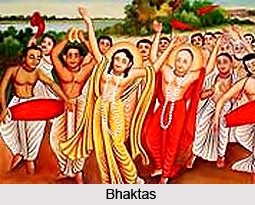 Thus, from it is very important for a bhakta to keep his mind in such a mind that it would not be into the path of either excessive sadness or excessive hilarity. It is required for the mind to strike a balance between both the two since religious realisations are possible only when the mind is in a steady, peaceful condition of harmonious equilibrium and this would be the beginning of the phase to learn how to love the Lord.
Thus, from it is very important for a bhakta to keep his mind in such a mind that it would not be into the path of either excessive sadness or excessive hilarity. It is required for the mind to strike a balance between both the two since religious realisations are possible only when the mind is in a steady, peaceful condition of harmonious equilibrium and this would be the beginning of the phase to learn how to love the Lord.
It is possible for a bhakta to first love the universal beings in order to love a particular being. When a bhakta goes on merely loving one person after another, he may go on loving them so for an infinite length of time, without being in the least able to love the world as a whole. However, there comes a stage in his life, when, at last, he understands the central idea that the sum total of all love is God. When the soul of a bhakta sees divine love, his heart becomes an eternal fountain of love. And when he reaches even the higher states of this love, all the creations of god- any animal or man is clearly seen as a manifestation of God and not as the creature itself! Thus, in this intense state of Bhakti, worship is offered to every one, to every life, and to every being.
As a result of this kind of intense supreme love, comes the feeling of perfect self-surrender and the bhakta has the conviction that anything that happens to him cannot harm him. Be it any pain, misery or even death, the loving soul of the bhakta welcomes it with a smile. The Bhakta in this state of perfect resignation arises out of intense love to God and ceases to distinguish between pleasure and pain in so far as they affect him.
Most of the individuals think about their body, to be the centre of their existence and even the center of their worship is to protect their body against other beings. For a vast majority of mankind, bodily enjoyment becomes the core of their existence. Thus, it is very important that until a man reaches that highest point of ever-ready and ever-willing self-sacrifice, he cannot become a perfect Bhakta. A bhakta should be an enlightened one, who is aware of the bodily existence, its pains and even its decomposition. Infact, a perfect bhakta is the one who readily accepts the fact that the human body is a combination of many materials, is never permanent and hence, it must get dissolved and die. There must and will come a time for it to be decomposed.
So, it is important for a bhakta to declare himself already dead to all the things of the world and surrendering himself to the divine entity. It is a well-known fact that the human body itself is the sole reason for all miseries like pain, selfishness and jealousy. Thus, the former should be given up for the service of the Lord to be away from such miseries and a bhakta should lead a life without any attachment and offer services to all the universal beings. A bhakta offers his life and his body at the feet of the lord. For the bhakta who has experienced the divine intervention, this eternal sacrifice of the self unto the Beloved Lord is much greater than any of the wealth or power, than even all soaring thoughts of renown and enjoyment. In this state of sublime resignation everything in the shape of attachment goes away completely, except the love to god in which all beings exist. This attachment of love to God is indeed one that does not bind the soul but effectively breaks all its bondages.



